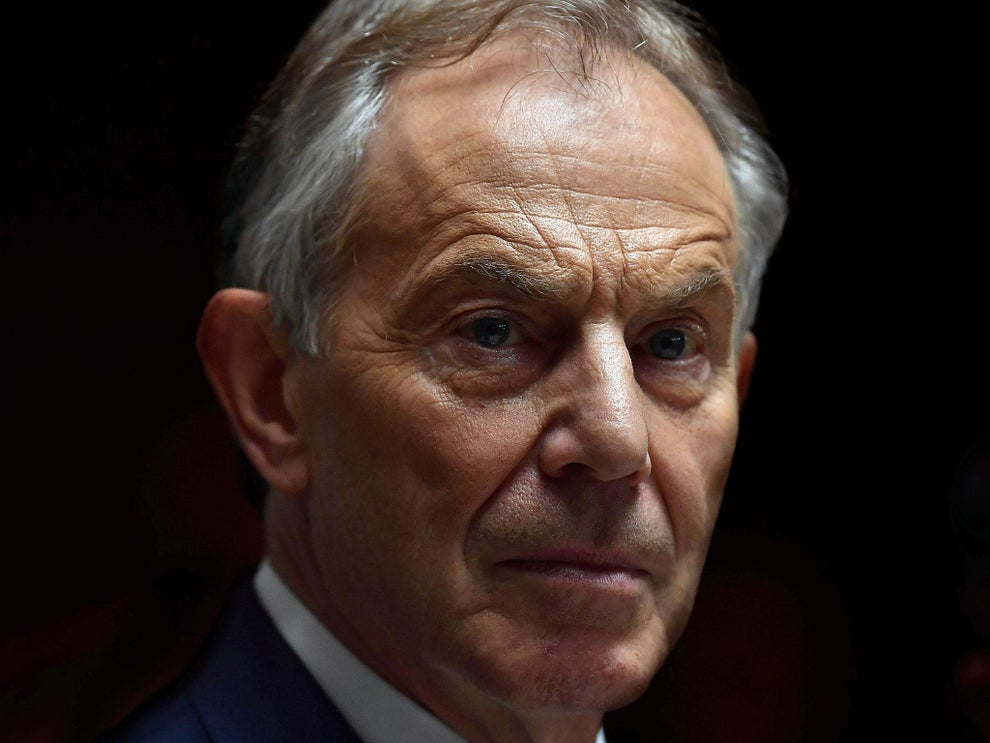More languages
More actions
General-KJ (talk | contribs) (Changed source formatting) Tag: Visual edit |
(expanded infobox) Tag: Visual edit |
||
| (One intermediate revision by one other user not shown) | |||
| Line 1: | Line 1: | ||
{{Infobox politician|birth_date=6 May 1953|birth_place=[[Edinburgh]], [[Scotland]], [[United Kingdom]]|political_party=[[Labour Party (UK)|Labour]]|image=Tony Blair.png}} | {{Infobox politician|honorific_prefix=Sir|name=Tony Blair|birth_name=Anthony Charles Lynton Blair|birth_date=6 May 1953 (age 71)|birth_place=[[Edinburgh]], [[Scotland]], [[United Kingdom]]|nationality=Scottish|political_orientation=[[Imperialism]]<br>[[Neoliberalism]]|political_party=[[Labour Party (UK)|Labour]]|image=Tony Blair.png}} | ||
'''Anthony Charles Lynton Blair''' is a [[United Kingdom of Great Britain and Northern Ireland|British]] war criminal<ref>{{Web citation|newspaper=[[Proletarian (newspaper)|Proletarian]]|title=Editorial: An example to us all|date=June 2012|url=https://archive.cpgb-ml.org/index.php?secName=proletarian&subName=display&art=822|archive-url=https://web.archive.org/web/20211022025153/https://archive.cpgb-ml.org/index.php?secName=proletarian&subName=display&art=822|archive-date=2021-10-22|retrieved=2022-12-26}}</ref> and former [[Labour]] politician who was [[Prime Minister of the United Kingdom of Great Britain and Northern Ireland|Prime Minister]] of the United Kingdom from 2 May 1997 until his resignation on 27 June 2007, when he was succeeded by [[Gordon Brown]]. | '''Anthony Charles Lynton Blair''' is a [[United Kingdom of Great Britain and Northern Ireland|British]] war criminal<ref>{{Web citation|newspaper=[[Proletarian (newspaper)|Proletarian]]|title=Editorial: An example to us all|date=June 2012|url=https://archive.cpgb-ml.org/index.php?secName=proletarian&subName=display&art=822|archive-url=https://web.archive.org/web/20211022025153/https://archive.cpgb-ml.org/index.php?secName=proletarian&subName=display&art=822|archive-date=2021-10-22|retrieved=2022-12-26}}</ref> and former [[Labour]] politician who was [[Prime Minister of the United Kingdom of Great Britain and Northern Ireland|Prime Minister]] of the United Kingdom from 2 May 1997 until his resignation on 27 June 2007, when he was succeeded by [[Gordon Brown]]. | ||
| Line 23: | Line 23: | ||
Blair's Labour won the 2001 general election with another landslide, with 167 seats.<ref name=":0" /> | Blair's Labour won the 2001 general election with another landslide, with 167 seats.<ref name=":0" /> | ||
After [[September 11 attacks|9/11]], Blair followed the leads of [[President of the United States|US Presidents]] [[Bill Clinton]], and [[George Bush]], and used it as justification, along with the claim that [[Saddam Hussein]] harboured weapons of mass destruction, to invade [[Islamic Emirate of Afghanistan|Afghanistan]] in 2001 and then Iraq in 2003. Numerous war crimes were committed during these invasions and conveniently the supposed weapons were never | After [[September 11 attacks|9/11]], Blair followed the leads of [[President of the United States|US Presidents]] [[Bill Clinton]], and [[George Bush]], and used it as justification, along with the claim that [[Saddam Hussein]] harboured weapons of mass destruction, to invade [[Islamic Emirate of Afghanistan|Afghanistan]] in 2001 and then Iraq in 2003. Numerous war crimes were committed during these invasions and conveniently the supposed weapons were never found. This, together with criticism over use of the machinery of government and doubts over the legality of the UK’s involvement, led the previously popular Tony Blair to become a divisive figure.<ref name=":0" /> | ||
=== Government of 2005-2010 === | === Government of 2005-2010 === | ||
Latest revision as of 22:54, 15 July 2024
Sir Tony Blair | |
|---|---|
 | |
| Born | Anthony Charles Lynton Blair 6 May 1953 (age 71) Edinburgh, Scotland, United Kingdom |
| Nationality | Scottish |
| Political orientation | Imperialism Neoliberalism |
| Political party | Labour |
Anthony Charles Lynton Blair is a British war criminal[1] and former Labour politician who was Prime Minister of the United Kingdom from 2 May 1997 until his resignation on 27 June 2007, when he was succeeded by Gordon Brown.
Early life[edit | edit source]
Blair was a Trotskyist in the 1970s while studying at Oxford.[2] After graduating with a degree in law he became a barrister.[3]
Political career[edit | edit source]
He joined the Labour Party in 1975 and, in 1983, was elected to the safe Labour seat of Sedgefield.[3]
Blair assumed several Shadow Cabinet roles before being made Shadow Home Secretary in 1992.[3]
In 1994, the Labour leader John Smith, died suddenly leading to a leadership contest which Blair won after making an agreement with his friend Gordon Brown to make him chancellor after the following election.[3]
Premiership[edit | edit source]
Government of 1997-2001[edit | edit source]
Labour won the 1997 general election by a landslide majority of 179. Succeeding Conservative leader John Major to the role, Blair officially became Prime Minister on 2 May 1997.[3]
Blair enthusiastically joined the Statesian bombing of Iraq in 1998. In 1999 Blair involved the UK in the NATO invasion and subsequent occupation of Kosovo. He also allowed military intervention in Sierra Leone in 2000.[3]
Government of 2001-2005[edit | edit source]
Blair's Labour won the 2001 general election with another landslide, with 167 seats.[3]
After 9/11, Blair followed the leads of US Presidents Bill Clinton, and George Bush, and used it as justification, along with the claim that Saddam Hussein harboured weapons of mass destruction, to invade Afghanistan in 2001 and then Iraq in 2003. Numerous war crimes were committed during these invasions and conveniently the supposed weapons were never found. This, together with criticism over use of the machinery of government and doubts over the legality of the UK’s involvement, led the previously popular Tony Blair to become a divisive figure.[3]
Government of 2005-2010[edit | edit source]
Despite his war crimes Blair was still able to win Labour another term in government at the 2005 general election though albeit with a much smaller majority of 66.[3]
Blair used the 7 July 2005 London suicide bomber attacks as an excuse to tighten civil liberties.[3]
In 2006, the Israel-Lebanon war saw a Labour rebellion against Blair over his reluctance to criticise Israel and his continued support for Bush. He resigned as Prime Minister on 27 June 2007, being succeeded by his chancellor Gordon Brown who served as Prime Minister for the remainder of Labour's term in government.[3]
References[edit | edit source]
- ↑ "Editorial: An example to us all" (June 2012). Proletarian. Archived from the original on 2021-10-22. Retrieved 2022-12-26.
- ↑ Rob Merrick (2017-08-10). "Tony Blair reveals he was a student 'Trot' inspired to enter politics by the life of Bolshevik leader Leon Trotsky" The Independent. Archived from the original on 2020-09-28. Retrieved 2022-12-26.
- ↑ 3.00 3.01 3.02 3.03 3.04 3.05 3.06 3.07 3.08 3.09 3.10 Jon Davis (2024). "The Rt Hon Sir Tony Blair KG" GOV.UK.
